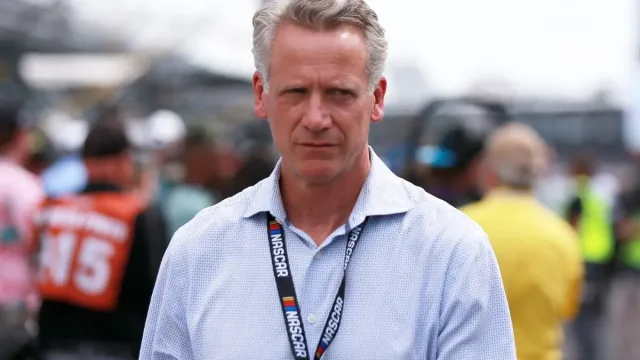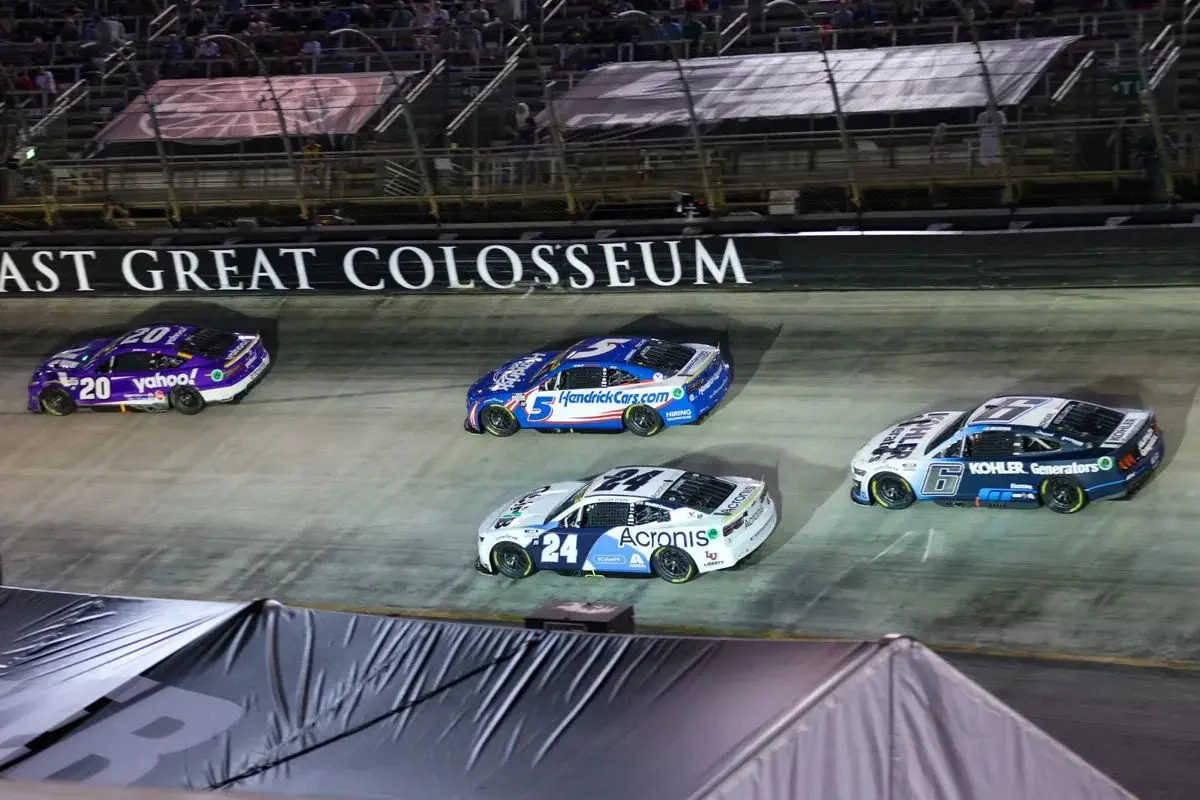Fans Slam NASCAR President Steve Phelps following his comments regarding the ongoing antitrust lawsuit initiated by 23XI Racing and Front Row Motorsports. Many fans accuse Phelps of prioritizing profit over the competitive integrity of the sport. Criticism centers on perceptions that his leadership is alienating the fan base and that he is maintaining financial coercion in negotiations.
The lawsuit challenges the restrictive terms of the 2025 NASCAR charter agreement, which may greatly affect the financial viability of teams. As the situation evolves, the implications for NASCAR’s future become increasingly uncertain. Further details reveal the complexities involved.
Key Highlights
- Fans are criticizing Steve Phelps for allegedly prioritizing profitability over genuine racing interests, leading to dissatisfaction with NASCAR’s direction.
- Phelps’ comments regarding the antitrust lawsuit have been interpreted as dismissive, further alienating the fan base.
- Many fans accuse Phelps of coercive negotiation practices that undermine competitive integrity in NASCAR.
- The controversy surrounding the 2025 charter agreement has heightened frustrations with Phelps’ leadership style and decisions.
- Overall, the sentiment among fans reflects a desire for change in NASCAR’s leadership to restore trust and competitive fairness.
NASCAR President Steve Phelps Responds to Antitrust Lawsuit
Addressing the recent antitrust lawsuit, NASCAR President Steve Phelps emphasized the organization’s commitment to fair negotiations and competitive integrity within the sport. The lawsuit, initiated by 23XI Racing and Front Row Motorsports, challenges the new 2025 charter agreement, alleging that it restricts financial and competitive opportunities for the teams involved.
Phelps acknowledged the complexity of the situation, stating, “Obviously we want a court victory,” while refraining from delving into specifics about the lawsuit or the motivations behind the actions taken by Michael Jordan and Denny Hamlin.
Notably, Phelps asserted that NASCAR engaged in “good faith” negotiations for over two years regarding the charter agreement. This assertion is vital, as it highlights NASCAR’s intent to maintain a collaborative atmosphere among its teams.
Moreover, Phelps highlighted that the majority of teams—13 out of 15, representing 32 charters—have opted to extend their agreements with NASCAR, suggesting a broader consensus among team owners about the charter’s value.
“Obviously, we want a court victory. I can’t get into the lawsuit, and I can’t speak to why Michael and Denny Hamlin decided to take this action. We negotiated in good faith for over two years. We had the majority of the teams—13 of 15, representing 32 charters—extend with us.” – Steve Phelps
This response from Phelps demonstrates an effort to balance transparency with legal prudence, as the organization navigates a potentially groundbreaking period in its governance. By expressing confidence in the negotiation process and the support from the majority of teams, NASCAR aims to reinforce its credibility and the integrity of its operational framework.
However, the lawsuit’s implications remain notable, and the outcome may shape the future landscape of competitive equity in NASCAR.
NASCAR Fans React to Steve Phelps’ Comments, Expressing Discontent
Following Steve Phelps‘ comments regarding the antitrust lawsuit and NASCAR’s commitment to competitive integrity, fans expressed considerable dissatisfaction with his leadership. The backlash was evident on social media, where many vocalized their discontent with Phelps and the current direction of the organization.
A frequent refrain in the comments was the sentiment that Phelps is fundamentally alienating the fan base, with one user bluntly stating, “Steve Phelps is driving people away from NASCAR. He should step down.” Such statements reflect a growing frustration with not only Phelps but also the overarching leadership strategy within NASCAR.
“F*** Steve Phelps.” – nascar fans’ reaction
Criticism of NASCAR’s leadership also highlighted perceptions of misaligned priorities. One fan remarked, “Well that’s a lie, but okay lol,” illustrating doubt towards Phelps’ assurances of competitive integrity.
Another pointedly noted, “NASCAR saying basically sign it or else is not operating in good faith,” suggesting a perception of coercive practices rather than collaborative engagement with teams and fans.
Moreover, the discontent echoed longstanding criticisms regarding NASCAR’s focus on profitability at the expense of the sport itself. A user referenced the late Dale Earnhardt, who purportedly indicated early on that financial motivations overshadowed genuine racing interests.
Such sentiments indicate not only a dissatisfaction with Phelps’ comments but also a deeper concern regarding the direction NASCAR is taking under his presidency. The collective reaction highlights a pivotal moment for NASCAR, as leadership faces increasing examination from its core supporters.
Charter Dispute and Teams’ Financial Concerns in Focus
What implications does the ongoing charter dispute hold for the financial stability of NASCAR teams? The lawsuit initiated by 23XI Racing and Front Row Motorsports has brought considerable attention to the constraints imposed by NASCAR’s leadership, particularly regarding the 2025 charter agreement.
The teams argue that the stringent terms within this agreement not only jeopardize their immediate financial viability but also threaten their long-term competitive standing.
The contention revolves around the notion that these limitations restrict growth opportunities, thus hindering teams from attracting necessary investments and resources. As competitive entities, NASCAR teams rely heavily on sponsorships and revenue-sharing models. If the charter system continues to enforce restrictive conditions, teams may find themselves unable to innovate or adapt tactically to a rapidly evolving sports landscape.
Moreover, the implications extend beyond individual teams; they pose broader risks to the general health of NASCAR as a premier racing series. If teams cannot thrive financially, the sport may face diminished talent across the board, ultimately affecting fan engagement and revenue streams.
The ongoing charter dispute, consequently, is not merely a legal battle; it is a critical juncture that could redefine the financial landscape of NASCAR and its teams, with potentially dire consequences for the sport’s future.
Judge Denies Expedited Discovery Motion, Sets Preliminary Hearing
The recent ruling in the ongoing legal battle concerning the charter agreement marks a remarkable moment for the involved teams and the broader NASCAR landscape. A district judge‘s denial of the expedited retrieval motion submitted by 23XI Racing and Front Row Motorsports highlights the complexities inherent in this case.
The motion aimed to secure swift access to NASCAR documents pertinent to the charter agreement, yet the court deemed the request too broad, imposing what it characterized as an undue burden on the governing body.
In her ruling, the judge emphasized that while the proposed retrieval could potentially aid the plaintiffs in establishing a likelihood of success, the requests lacked the necessary specificity. This decision reflects a judicial caution in balancing the needs of the racing teams with the operational integrity of NASCAR.
“While the proposed discovery requests may help Plaintiffs show a likelihood of success on the merits, they are not sufficiently narrowly tailored, and Plaintiffs argue the record is sufficient to support their motion for preliminary injunction as it stands… Plaintiffs concede that they do not actually require expedited discovery, at least for the purposes of their motion for a preliminary injunction.” – the ruling
The implications of this ruling are substantial; it delays access to potentially critical information that could influence the outcome of the case.
The preliminary hearing, scheduled for November 4, will be pivotal as it will assess whether 23XI Racing and Front Row Motorsports can maintain their charter rights during the ongoing litigation.
This hearing will not only set the stage for the legal arguments to come but will also have enduring effects on the financial and competitive landscape of NASCAR. As stakeholders continue to navigate these turbulent waters, the outcome of the preliminary hearing could reshape the future of team operations within the sport.
News in Brief: Fans Slam NASCAR President
The backlash against NASCAR President Steve Phelps highlights the tensions surrounding the ongoing antitrust lawsuit and the charter system’s implications for team finances. The fans’ reactions underscore a broader dissatisfaction with the governance and operational transparency within NASCAR.
With the recent judicial decision denying expedited exploration and setting a preliminary hearing, the situation remains unstable, suggesting that the resolution of these disputes will greatly influence the future landscape of the sport and its stakeholders.
ALSO READ: Race Industry Week to Feature Steve Phelps—Here’s What He’s Expected to Say About NASCAR’s Future!



